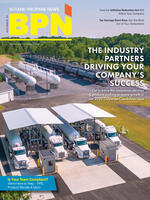
I just moved across the country into a house that has been under construction during the pandemic. It was a challenging time for the builders who were trying to make me feel connected to the process 2,500 miles away. And it’s certainly been a challenging time to be the buyer, trying to follow the progress, understand my options and make decisions over Zoom.
Regardless of who your customers are, the region you’re in or the area of the propane industry your company serves, everyone has had to adapt over the past few years in the ways they serve customers and lead teams of employees.
But if you don’t already manage your business from a perspective of wanting to unleash the individuality of your customers or your employees, then those adaptions are too surface level to have a meaningful impact.
During the construction of my home, the builders held weekly updates with me over Zoom. Good start. But it was always about them giving me an update on what they were doing. They would list the decisions that needed to be made, and I would make them. It was friendly and professional, but the experience felt completely transactional. I was just choosing which Lego pieces to add to the mix or not.
The few times I visited the site while construction was in progress, I found things I would have decided differently if I had known a little more and had more context. When we had our weekly calls, someone could have brought a video camera into the house to help me see what I was deciding. They could have thought beyond, “Do you prefer this one or that one?” and gone deeper with questions like, “What matters to you? How do you like to live in your home? What do you want for your daughter?”
I wasn’t paying for a completely custom-built house, so obviously, there’s a limit to how much personalization I could expect. I get that. But the experience itself could have been managed in a way that would have made me feel like it was more personalized to me. I felt like my opinions only mattered as a way to move the process along, not as anything important to me as an individual. And that’s a lost opportunity for anyone managing a business.
Donna Hicks, Ph.D., is an expert in human dignity and a specialist in conflict resolution. Through her work, she identified a major obstacle in human relationships: “Our failure to recognize how vulnerable humans are to be treated as if they didn’t matter.” (From her 2011 book, “Dignity: Its Essential Role in Resolving Conflict.”) This applies to both your customers and to the people you lead and partner with.
Where There’s an Obstacle, There’s An Opportunity
Today’s leaders are pulled in so many directions. There’s overwhelming pressure to figure out hybrid remote teams and how to thrive in our perpetual state of uncertainty. Meanwhile, leaders are also trying to fulfill their promises of inclusion while elevating their commitment to personalizing well-being.
There are plenty of places you can find step-by-step guides for things like using technology with remote teams, what trends to watch to survive uncertainty, how to find more diverse candidate pools or what wellness benefits are most in demand. But those issues — while important — are secondary to our much deeper challenges stemming from our decades of suppressing individuality. And people are finished being suppressed. Consider these trends:
- The No. 1 environmental, social and governance issue for Americans isn’t climate change, it’s treatment of workers.
- First on Harvard Business Review’s list of trends for 2022 is an emphasis on fairness and equity (the authors said its frequency as a topic on earnings calls has increased by 658% since 2018).
- Helping people feel worthy is a skill leaders need to develop. According to Deloitte Digital Chief Experience Officer Amelia Dunlop, it matters to nine out of 10 people to feel worthy, but five out of 10 struggle to feel worthy, particularly at work.
But we suppress individuals without even knowing it. We inadvertently keep people functioning far below their full capacity. We fail to see and support each other’s dignity. We don’t know how to make sure people know that they matter.
People Matter
My opening example might seem small compared to the truly egregious ways humans oppress each other. But that’s why I like it. It shows how insidious this problem is — the everyday ways we are made to feel like we don’t matter.
As leaders, we make assumptions about people based on what we think we know about them. Or we don’t take time to know them because we need to stick to our schedules, and that means adhering to our rigid protocols that may have been established for reasons that don’t even exist anymore.
From my work with thousands of people at some of the biggest organizations in the world, here are five truths I’ve identified that can help keep us grounded in the humanity of the people we’re working with. I’ve also included questions that help us assess our own assumptions, perspectives and actions.
1. We have value: We want to be included.
Who is invited to participate or contribute in this endeavor or decision? Who is missing? Why? Are those reasons valid, or are they simply accepted and unquestioned?
2. We are worthy: We want to be seen in our full humanity.
Do you have ways of knowing people as individuals? Or are you making assumptions about them based on their group, their role or their background?
3. We are unique: We want to be ourselves.
Do you pressure people to conform to an identity you care about, rather than letting them discover and share their own identity?
4. We have experience & insight: We want to do more.
Do you make assumptions about someone’s capabilities based on what you know about their education or work experience? Do you know what the people you lead are capable of? Do you know what challenges they are uniquely suited to solve, or which ones they are drawn to?
5. We have ideas: We want to explore our possibility.
Do you let people challenge the accepted methods, expand beyond stale best practices, try new ideas and attack challenges in their own way? Do you make assumptions about how someone should perform a task based on how we’ve done it or seen it done in the past?
Why should you care about any of this? Because almost everyone is holding something back: a good idea, a new method, an informed opinion or the full extent of their abilities. Their reasons for holding back might be sound. Maybe, like me, they didn’t realize in the moment that they could do more. Most often it’s because they’ve been stifled by the status quo and treated as if they didn’t matter.
But in a world where new technologies and business models can make our own products and services obsolete before we see what’s coming, we can’t afford to have organizations filled with people whose individual capacities are stifled in any way.
Consider how easy it would have been for the contractors building my home to make me feel like I mattered more than their own processes and protocols. It wouldn’t have required big investments in new technology or equipment.
All it requires is a leader making an effort to understand the five truths above, to interrupt themselves or others when those truths are forgotten or ignored, and to pivot in the moment to acknowledge the individual in front of them.
Make sure people know they matter.


